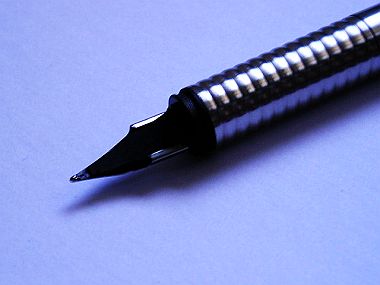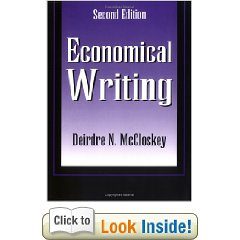One of the best books for writers in the social sciences is Deirdre McCloskey’s Economical Writing, a very short, very small book that offers a number of important principles for writing. McCloskey is an economist by training, but she has written across a wide variety of fields. Economical Writing is a must-have and a must-read for any serious writer. Here are five of her points from Economical Writing and elsewhere I have tried to incorporate into my own work (not always perfectly, certainly, as my dissertation committee could not doubt verify).
1. Always ask “so what?”
Don’t assume that your topic is important just because you think it is, and don’t assume everyone automatically recognizes its relevance. Be very clear about establishing why your topic is important and why your reader should care. Your reader’s time is very valuable, and he or she could be doing a lot of different things. They have decided, for whatever reason, to take a look at something you have written. Look to inflict interocular trauma. In other words, hit them between the eyes with why what you have done is important. Convince them immediately that they should keep reading your work instead of picking up something someone else has written or playing with the kids.
2. Always ask “how do you know?”
According to McCloskey, this was always Milton Friedman’s question, and in the last two-and-a-half decades, McCloskey has waged a campaign against sloppy empirical methods particularly in economics but in all the sciences more generally. Clarify the theory you are examining, the testable hypotheses that they admit, the types of evidence you have at your disposal, and how you should best test the hypotheses you have devised. If you are measuring something, make sure you ask “how big is big?” In other words, talk about magnitude. A lot of statistical investigations discuss “statistical significance” and leave it at that, but statistical significance tells us nothing about whether the magnitude of an estimated effect is big enough to matter. Statistical significance only tells us whether we have enough data to measure the effect with much precision. Life-and-death situations are made every day based on flawed applications of statistical significance and very poorly-thought-out use of evidence. The world deserves better.
3. “Fluency can be achieved through grit.”
Or, in the words of 1986 Nobel Laureate James Buchanan, “keep your a– in the chair.” Write, even when you don’t feel like writing. Make it a habit rather than something you do when inspiration strikes. Your work will be much better for it.
4. Guard your inspiration and “clean up in a dull moment.”
The world is screaming for your attention (Facebook! iChat! Lifehack! Youtube! Twitter!), and it is up to you to make sure you don’t let urgent-but-unimportant things get in the way of doing important work. One scholar periodically mails his internet cable to himself in order to give himself at least a couple of days free of the distractions of the internet. It is hard to lay down the digital crack pipe, but you must. As McCloskey writes, when you are truly inspired, you must resist the urge to go the library to check your sources, to go get another cup of coffee, to return phone calls, or to answer email. This can all be done during the dull moments when the creative juices aren’t flowing quite the way you would like them to.
5. Don’t skimp on supplies.
A great writer can be a great writer no matter his surroundings or materials, but having equipment that works well is essential for most of us. A laptop that is on its last legs can be extremely frustrating to work with, and good pens can be much easier to work with than the ballpoints you pick up from hotel rooms (I have tons of them; I know). Remember that paper is cheap and recycling it is bad for the earth–it creates a lot of pollution, and since trees are farmed commercially you actually aren’t “saving trees” by recycling paper or by using less of it. Making judicious use of scrap paper is wise, but incurring inconvenience in order to save paper is a very poor tradeoff. There are a lot of economists and social scientists who have written extensively in the scholarly problem. McCloskey is one of the best, and I assure you that you will be a much better writer if you have Economical Writing on your bookshelf.

